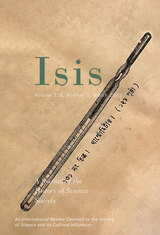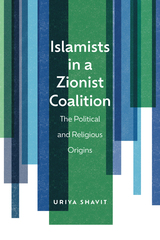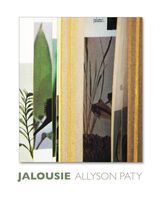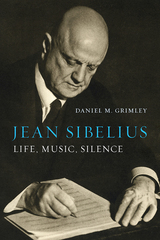
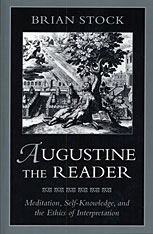
Augustine of Hippo, a central figure in the history of Western thought, is also the author of a theory of reading that has had a profound influence on Western letters from the ages of Petrarch, Montaigne, Luther, and Rousseau to those of Freud and our own time. Brian Stock provides the first full account of this theory within the evolution of Augustine’s early dialogues, his Confessions, and his systematic treatises.
Augustine was convinced that words and images play a mediating role in our perceptions of reality. In the union of philosophy, psychology, and literary insights that forms the basis of his theory of reading, the reader emerges as the dominant model of the reflective self. Meditative reading, indeed the meditative act that constitutes reading itself, becomes the portal to inner being. At the same time, Augustine argues that the self-knowledge reading brings is, of necessity, limited, since it is faith rather than interpretive reason that can translate reading into forms of understanding.
In making his theory of reading a central concern, Augustine rethinks ancient doctrines about images, memory, emotion, and cognition. In judging what readers gain and do not gain from the sensory and mental understanding of texts, he takes up questions that have reappeared in contemporary thinking. He prefigures, and in a way he teaches us to recognize, our own preoccupations with the phenomenology of reading, the hermeneutics of tradition, and the ethics of interpretation.
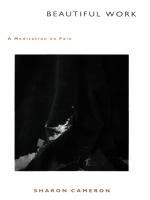
In order to understand the nature of pain, Anna undertakes a meditation practice. We tend to think of pain as self-absorbing and exclusively our own ("my pain," "I am in pain"). In distinction, Sharon Cameron’s Anna comes to explore pain as common property, and as the basis for a radically reconceived selfhood. Resisting the limitations of memoir, Beautiful Work speaks from experience and simultaneously releases it from the closed shell of personal ownership. Outside of the not quite inevitable stories we tell about it, experience is less protected, less compromised, and more vivid than could be supposed.
Beautiful Work brings to bear the same interest in consciousness and intersubjectivity that characterizes Cameron’s other work.
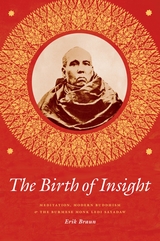
Braun focuses on the Burmese monk Ledi Sayadaw, a pivotal architect of modern insight meditation, and explores Ledi’s popularization of the study of crucial Buddhist philosophical texts in the early twentieth century. By promoting the study of such abstruse texts, Braun shows, Ledi was able to standardize and simplify meditation methods and make them widely accessible—in part to protect Buddhism in Burma after the British takeover in 1885. Braun also addresses the question of what really constitutes the “modern” in colonial and postcolonial forms of Buddhism, arguing that the emergence of this type of meditation was caused by precolonial factors in Burmese culture as well as the disruptive forces of the colonial era. Offering a readable narrative of the life and legacy of one of modern Buddhism’s most important figures, The Birth of Insight provides an original account of the development of mass meditation.
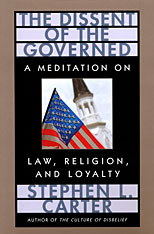
Between loyalty and disobedience; between recognition of the law’s authority and realization that the law is not always right: In America, this conflict is historic, with results as glorious as the mass protests of the civil rights movement and as inglorious as the armed violence of the militia movement. In an impassioned defense of dissent, Stephen L. Carter argues for the dialogue that negotiates this conflict and keeps democracy alive. His book portrays an America dying from a refusal to engage in such a dialogue, a polity where everybody speaks, but nobody listens.
The Dissent of the Governed is an eloquent diagnosis of what ails the American body politic—the unwillingness of people in power to hear disagreement unless forced to—and a prescription for a new process of response. Carter examines the divided American political character on dissent, with special reference to religion, identifying it in unexpected places, with an eye toward amending it before it destroys our democracy.
At the heart of this work is a rereading of the Declaration of Independence that puts dissent, not consent, at the center of the question of the legitimacy of democratic government. Carter warns that our liberal constitutional ethos—the tendency to assume that the nation must everywhere be morally the same—pressures citizens to be other than themselves when being themselves would lead to disobedience. This tendency, he argues, is particularly hard on religious citizens, whose notion of community may be quite different from that of the sovereign majority of citizens. His book makes a powerful case for the autonomy of communities—especially but not exclusively religious—into which democratic citizens organize themselves as a condition for dissent, dialogue, and independence. With reference to a number of cases, Carter shows how disobedience is sometimes necessary to the heartbeat of our democracy—and how the distinction between challenging accepted norms and challenging the sovereign itself, a distinction crucial to the Declaration of Independence, must be kept alive if Americans are to progress and prosper as a nation.
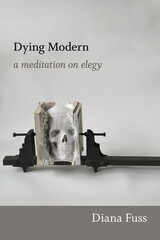
Focusing primarily on American and British poetry written during the past two centuries, Fuss maintains that poetry can still offer genuine ethical compensation, even for the deep wounds and shocking banalities of modern death. As dying, loss, and grief become ever more thoroughly obscured from public view, the dead start chattering away in verse. Through bold, original interpretations of little-known works, as well as canonical poems by writers such as Emily Dickinson, Randall Jarrell, Elizabeth Bishop, Richard Wright, and Sylvia Plath, Fuss explores modern poetry's fascination with pre- and postmortem speech, pondering the literary desire to make death speak in the face of its cultural silencing.
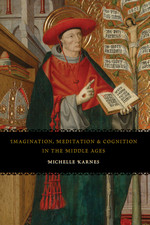
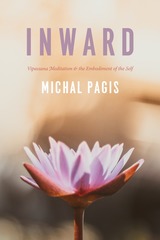
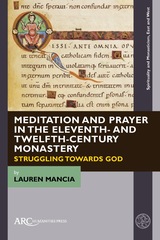

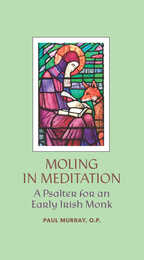
Jeremy Driscoll, O.S.B. Abbot of Mount Angel Abbey
Paul Murray’s poetry is always a miracle of compression and economy without ever seeming sparse or austere. These luminous meditative pieces have the richness that comes from an intent focus on the everyday and the material as carrying immeasurable grace.
Rowan Williams, Former Archbishop of Canterbury
The present work contains poems and meditations voiced by Paul Murray for Moling, an Irish monk and poet of the 7th century. In the Irish tradition, Moling is the figure who most resembles St Francis of Assisi. He is a man, a saint, whose presence resists linear history, who yet walks toward us in wonder and myth. In Moling in Meditation, the poems, though quiet in their form and expression, represent nevertheless a fresh and, at times, bold exploration of states of soul and psyche which, in almost every age, accompany the spiritual journey.
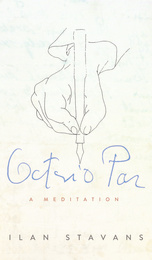

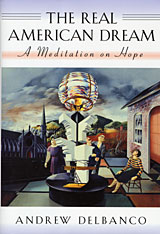
Since we discovered that, in Tocqueville’s words, “the incomplete joys of this world will never satisfy the heart,” how have we Americans made do? In The Real American Dream one of the nation’s premier literary scholars searches out the symbols and stories by which Americans have reached for something beyond worldly desire. A spiritual history ranging from the first English settlements to the present day, the book is also a lively, deeply learned meditation on hope.
Andrew Delbanco tells of the stringent God of Protestant Christianity, who exerted immense force over the language, institutions, and customs of the culture for nearly 200 years. He describes the falling away of this God and the rise of the idea of a sacred nation-state. And, finally, he speaks of our own moment, when symbols of nationalism are in decline, leaving us with nothing to satisfy the longing for transcendence once sustained by God and nation.
From the Christian story that expressed the earliest Puritan yearnings to New Age spirituality, apocalyptic environmentalism, and the multicultural search for ancestral roots that divert our own, The Real American Dream evokes the tidal rhythm of American history. It shows how Americans have organized their days and ordered their lives—and ultimately created a culture—to make sense of the pain, desire, pleasure, and fear that are the stuff of human experience. In a time of cultural crisis, when the old stories seem to be faltering, this book offers a lesson in the painstaking remaking of the American dream.
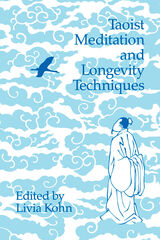
READERS
Browse our collection.
PUBLISHERS
See BiblioVault's publisher services.
STUDENT SERVICES
Files for college accessibility offices.
UChicago Accessibility Resources
home | accessibility | search | about | contact us
BiblioVault ® 2001 - 2025
The University of Chicago Press


